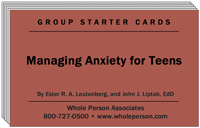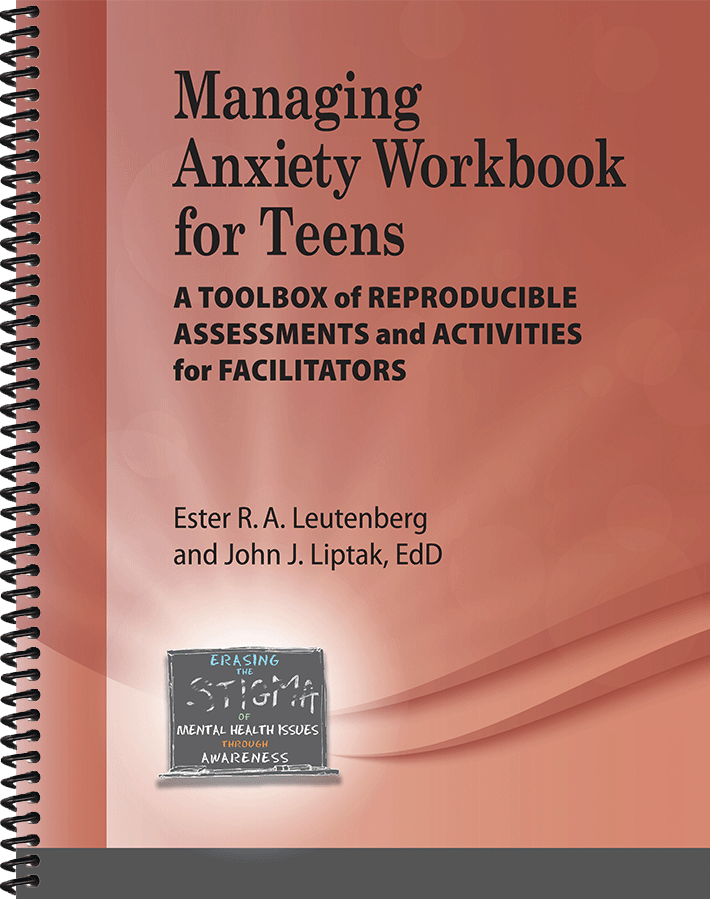Managing Anxiety for Teens
Use this workbook with clients who have been diagnosed with or may be showing signs of:
- Panic Disorders
- Generalized Anxiety Disorder
- Specific Phobias
- Social Anxiety Disorder
- Unspecified Anxiety Disorder
- Agoraphobia
- Obsessive-Compulsive Disorders
In this workbook, we've used "anxiety" as an umbrella term to address mental health issues associated with these diagnoses.
Teens experience stress in many situations and circumstances, and anxiety is a normal stress reaction. For teens, such circumstances as speaking in public, moving to a new neighborhood, dating issues, taking tests, making good grades, and competing in athletic events may cause stress. For some teens, various circumstances or events can cause more stress, leading to anxiety.
Anxiety is a state of intense apprehension, uncertainty, and fear resulting mainly from the anticipation of a threatening event or situation, often to the degree that disrupts everyday physical and psychological functioning. Fear is an emotional response to a real or perceived threat. Anxiety is the anticipation of a future threat.
Anxiety is normal in everyday life of all people and can be a good thing. Anxiety motivates one to accomplish goals and warns a person of a dangerous situation. However, intense anxiety can involve debilitating symptoms and affect performance in school, athletics, and interpersonal interactions. Some teens persistently experience excessive worry and fear about everyday situations, which may lead to depression. Persistent anxiety and fear can interfere with daily activities. Often, these symptoms are difficult to control.
This workbook provides facilitators who work with teens who may be experiencing intense anxiety issues with a series of reproducible activities to supplement their work with teens. The reproducible exercises can be photocopied or adapted by whiting out and writing in your changes to suit the needs of each group, using that page as your master copy to be photocopied for each participant.
The Awareness Modules
The reproducible awareness modules contained in this workbook will help you identify and select assessments and activities easily and quickly:
Module I: Signs of Stress Symptoms
This module will help participants explore the signs of stress in their lives, recognize anxiety symptoms, and learn tools to help decrease the anxiety.
Module II: Need for Control
This module will help participants explore the various ways they need to be in control of their lives.
Module III: Social Approval
This module will help participants explore how their need for the approval of others affects their functioning in social situations.
Module IV: Perfectionism
This module will help participants explore how their need to be perfect and mistake-free and their determination to achieve unrealistic standards can cause anxiety.
Module V: Erasing the Stigma of Mental Health Issues
This module will help participants explore the stigma of having intense anxiety and the impact that the stigma has on them.
This workbook is also available in PDF eBook format, making it simple to store on your computer or mobile device and access with a PDF viewer. The PDF format allows you to easily print copies of the activities and worksheets during therapy and counseling sessions.
 Managing Anxiety for Teens Card Deck
Managing Anxiety for Teens Card Deck
Use the open-ended questions with groups or individuals to kick-start a session. Each question corresponds to a specific page in the book.
Sample Questions:
What triggers your stress in the community or your neighborhood?
What do you wish you could have more control over?
What thoughts go through your mind when you are worried about doing something perfectly? Are they realistic?



